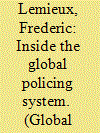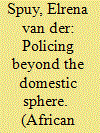| Srl | Item |
| 1 |
ID:
185077


|
|
|
|
|
| Summary/Abstract |
Within recent critical debates about the geographies and circulations of counterinsurgency knowledge, scholars have focused primarily on dominant centres of power and authority in the global North. Building a framework drawn from critical geography, this article decentres these locations and actors by exploring the global production and circulation of counterinsurgency knowledge from the vantage point of Indian strategic thinkers. Focusing on the work of the Indian think tank the Institute for Conflict Management (ICM), the article traces how Indian counterinsurgency knowledge has been produced, packaged and circulated transnationally since the late 1990s. It argues the power and utility that forms of counterinsurgency knowledge command – Indian or otherwise – are never reducible to the essential features of what actors or texts say. Rather, it suggests that counterinsurgency knowledge is produced through particular relations and locations of power-knowledge that define what they represent and where they fit in. It theorizes forms of counterinsurgency knowledge as positions within broader transnational forces, entwined with colonial histories of pacification. In doing so, it illuminates the contestations and forms of work involved in staging or organizing the world through practices that make some forms, actors, and locations important and relegate others to the peripheries of global politics.
|
|
|
|
|
|
|
|
|
|
|
|
|
|
|
|
| 2 |
ID:
137253


|
|
|
|
|
| Summary/Abstract |
This article provides an original perspective on global policing by scrutinizing how international liaison officers perform their duties in collaboration with police agencies in the United States. By analyzing the experience of ILOs deployed in Washington, DC, the study focuses on the identification of adaptation strategies as well as the integration mechanisms they are employing to achieve their mission. The research uses the theoretical framework developed by Michel Crozier and Erhard Friedberg (strategic analysis) and scrutinizes the use of power and influence by ILOs as well as the game dynamic between US police-agency officers and international liaison officers. The findings show that international liaison officers are highly autonomous, but their experience in terms of adaptation and integration into the global policing system may vary greatly according to the strategies they are employing.
|
|
|
|
|
|
|
|
|
|
|
|
|
|
|
|
| 3 |
ID:
187764


|
|
|
|
|
| Summary/Abstract |
Global policing efforts go far beyond combatting terrorism. The United States has tracked down war criminals in the former Yugoslavia, prosecuted Mexican drug kingpins in U.S. courts, transferred a Congolese warlord to the International Criminal Court, and even invaded foreign countries to apprehend wanted suspects. Likewise, Chinese police and intelligence forces crisscross the globe engaging in surveillance, abductions, and forced repatriations. But global policing activities are hard to study because they tend to occur “in the shadows.” Extradition treaties—agreements that facilitate the formal surrender of wanted fugitives from one country to another—represent a unique part of the global policing architecture that is directly observable. An original dataset of every extradition treaty that the United States has signed since its independence shows that extradition cooperation is not an automatic response to the globalization of crime. Instead, it is an extension of geopolitical competition. Geopolitical concerns are crucial because many states try to weaponize extradition treaties to target their political opponents living abroad, not just common criminals. Future research should reconceptualize the role of individuals in international security because many governments believe that a single person—whether a dissident, a rebel, or a terrorist—can imperil their national security.
|
|
|
|
|
|
|
|
|
|
|
|
|
|
|
|
| 4 |
ID:
109927


|
|
|
|
|
| Publication |
2011.
|
| Summary/Abstract |
The deployment of ever-growing numbers of police in support of peacekeeping and peacebuilding objectives under the mandate of the United Nations is a feature of modern policy. Field research into the role, function and routine experiences of police in peace missions is critical to an understanding of the dynamics underlying foreign deployment and the impact on police institutions at home. This paper draws on a series of focus group discussions with South African police who had been deployed to Darfur, Sudan, and describes key aspects of the experience as narrated by them afterwards.
|
|
|
|
|
|
|
|
|
|
|
|
|
|
|
|